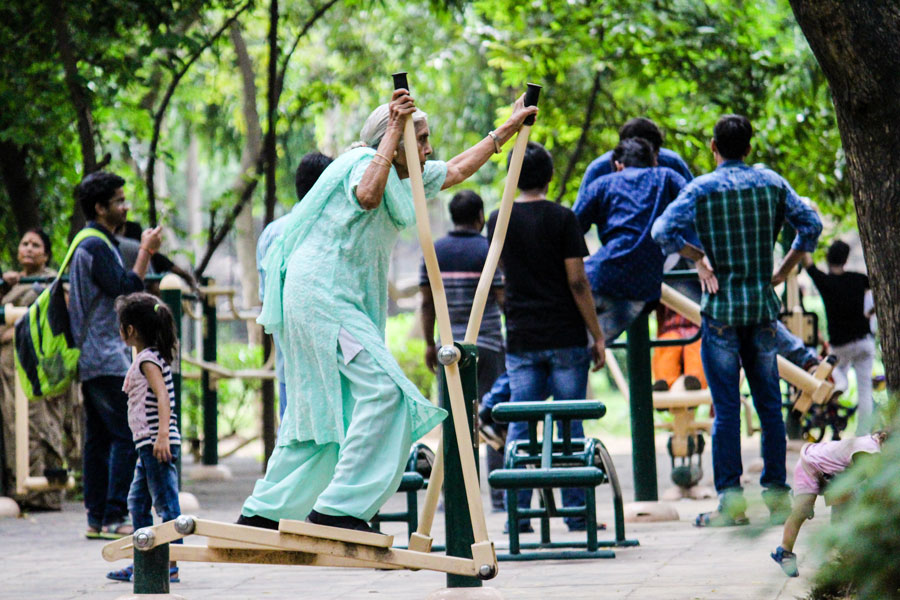There are two aspects to ageing. Your chronological age is the calculated number of years you have lived. Your biological or “real” age refers to the current condition of your physiological body at its very basic cellular level. These two are not necessarily one and the same. An individual may be chronologically 30, but might have the body and mind of a 55-year-old. He could be overweight, lethargic, with poorly conditioned muscles, poor memory, productivity and low stamina. He may be stressed, depressed, with a laundry list of medical conditions and pills to manage them.

On the contrary, someone could be 50 years old chronologically but have an actual age of a 35-year-old in terms of energy, stamina, strength, and pure joi de vivre.
Factors that ascertain your Real or Biological age
These are blood pressure, heart rate and other metabolic parameters such as blood sugar and cholesterol, eyesight, lungs, heart, vocal cords, skin turgor, energy levels, physical appearance, condition and tone of your muscles, mental acuity, memory, level of independence, fat percentage, lean body mass and fitness levels (cardio vascular endurance, flexibility, strength, agility, reflexes, balance, coordination and so on).
Your ‘real’ or biological age
Of course genes set the stage for a good or poor quality body. But lifestyle choices are the ultimate predictors of the ageing process. However good your genes, if you subject your body to stressors such as tobacco, alcohol, drugs, poor lifestyle choices on a daily basis like unhealthy food and lack of proper exercise, rapid ageing is imperative. It is said that your genes load the gun but your lifestyle pulls the trigger.
Here are some lifestyle measures that can arrest and even reverse the ageing process:
- Eat right – Eat food rich in anti-oxidants, minerals, vitamins and fibre. Fruits, vegetables, berries, nuts, seeds and pulses provide protein and good quality fats. Avoid processed and refined food, tobacco and excessive alcohol.
- Exercise the right way – A well designed fitness routine should include cardio vascular activity such as running, speed walking, cycling or aerobic sessions. It should be balanced with a strength training routine to build muscle and a stretch routine to maintain flexibility of the muscles. Muscles being critical for movement need to be worked against resistance (either an external weight or one’s own body weight) to be maintained at an optimum or improved. They also need to be stretched to maintain elasticity.
Muscle atrophy (decrease) and frailty with age and disuse is the primary cause for lack of mobility. It affects performing even the most rudimentary tasks. Modalities like yoga and total body stretches keep the body limber, prevent pain and addresses poor posture due to muscle imbalance.
Exercise is most definitely the closest we have ever come to an anti-ageing pill. Expensive skin creams that promise wrinkle-free skin, cosmetic surgery, laser ablation, Botox etc. are only solutions to the superficial signs of ageing. They cannot come close to the benefits obtained from a regular heart pumping, well-planned exercise routine.
- Maintain your body weight – Weight gain with age is not inevitable. With the right nutrition and exercise, it is possible to maintain your body weight and in fact even improve the quality of your body.
- Manage stress – Stress is very much a part our everyday lives. Eliminating it altogether is of course too much to expect. Managing stress effectively however is possible with meditation, relaxing techniques, time management and training the mind to handle situations and stress differently.
- Nurture a hobby/passion – Simple things like developing a hobby or even working on something you love and are passionate about can change one’s perspective to ageing.
- Maintain strong relationships – Strong ties with family or close friends can be enormously rewarding experiences that add meaning to life.
- Sleep well – Sleep is not only restive but also restorative. Long-term sleep deprivation has been known to be associated with an increase in Type 2 diabetes, obesity, hypertension, depression and even memory and attention problems. Work related sleep dysfunction (such as in shift workers, doctors and nurses), poor sleep hygiene, stress, obesity, overeating near bedtime, can all lead to poor sleep. Good quality sleep is closely related to a good quality, productive life.
To evaluate your Real age, ask the following questions
- Do you enjoy life? Do you look forward to the new day?
- Do you have strong, nurturing relationships?
- Do you enjoy the work you do?
- Do you exercise regularly, sleep well and eat healthy?
- Are you excited to get out of bed in the morning? (Granted that sometimes some of us are too fatigued to register excitement and just wish for a few more moments of blissful sleep, but that is a different discussion altogether!)
- Do you feel you have purpose and meaning in life or are you drifting along wondering what to do?
- Are you passionate about some cause or hobby?
Evaluate your fitness
- Can you run or even walk up a flight of stairs and not feel like you are dying at the end (or middle) of it?
- Can you touch the floor standing up without bending your knees?
- How fast can you walk a mile and how quickly do you recover from the exertion? (Called the One Mile Walk test, this can be evaluated in a gym setting).
- What is your weight, fat percentage and your waist circumference?
- How many proper pushups and squats can you do?
- How much medication, besides basic supplements, sit on your table waiting to be consumed every day?
Ageing is the most natural process of the human body and certainly cannot be arrested altogether. It can however be done gracefully with every attempt made to remain independent and productive, even if only to oneself.
The author, an Obstetrician and Gynaecologist, is a fitness & lifestyle consultant, and has published two books: Get Size Wise; Gain to lose.
www.drsheela.nambiar.com





